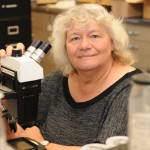Thomas’s Microfossil, Climate Change Research Published in 2 Journals

Ellen Thomas, the University Professor in the College of Integrative Sciences, research professor of earth and environmental science, is the co-author of two recently published papers. They include:
“Microfossil evidence for trophic changes during the Eocene–Oligocene transition in the South Atlantic (ODP Site 1263, Walvis Ridge),” published in Climate of the Past, Volume 11, pages 1249–1270 in September 2015 and “Changes in benthic ecosystems and ocean circulation in the Southeast Atlantic across Eocene Thermal Maximum 2,” published in the journal Paleoceanography, Volume 30, pages 1059-1077 in August 2015.
“Microfossil evidence” describes changes in organisms living in the oceans during a major change in the earth’s climate, a period of global cooling about 33.7 million years ago, when the Antarctic ice sheet first became established. The seven co-authors are all women, including former Wesleyan graduate student Raquel Fenero.
The researchers examined the biotic response of calcareous nannoplankton to environmental and climatic changes during the Eocene–Oligocene transition at Ocean Drilling Program (ODP) Site 1263 (Walvis Ridge, southeast Atlantic Ocean). During this time interval, global climate, which had been warm under high levels of atmospheric CO2 during the Eocene, transitioned into the cooler climate of the Oligocene.
In the Paleoceanography article, Thomas and her co-authors describe changes in benthic ecosystems in the oceans during a short period of global warming about 53.7 million years ago, and the effects of loss of oxygen and ocean acidification. The researchers include climate and geochemical modeling to indicate that changes in ocean circulation due to warming triggered more profound effects on living organisms at some depths than at other depths, and that the response of life forms to global warming (including feedback effects) thus may be complex. This article is the result of research done during Thomas’s stay as Leverhulme Visiting Professor at the University of Bristol in the United Kingdom, where she co-supervised graduate student Suzy Jennions.
“Our combined ecological and modeling analysis illustrates the potential role of ocean circulation changes in amplifying local environmental changes and driving temporary, but drastic, loss of benthic biodiversity and abundance,” Thomas said.

